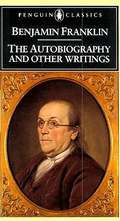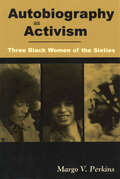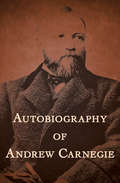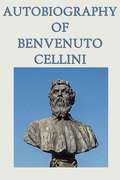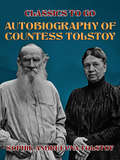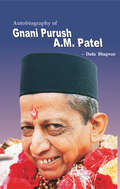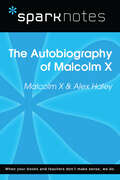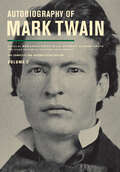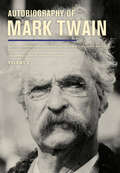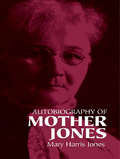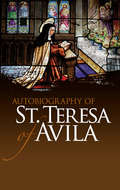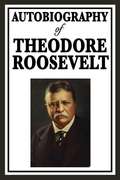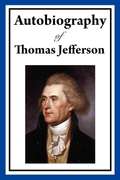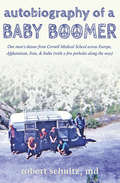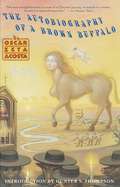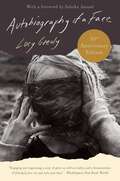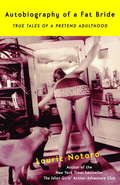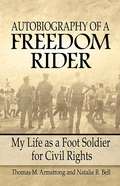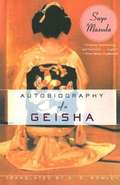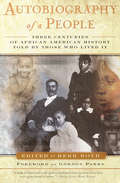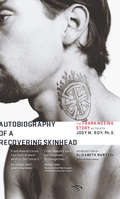- Table View
- List View
Autobiography and Other Writings
by Benjamin FranklinBenjamin Franklin's writings represent a long career of literary, scientific, and political efforts over a lifetime which extended nearly the entire eighteenth century. Franklin's achievements range from inventing the lightning rod to publishing Poor Richard's Almanack to signing the Declaration of Independence. In his own lifetime he knew prominence not only in America but in Britain and France as well. This volume includes Franklin's reflections on such diverse questions as philosophy and religion, social status, electricity, American national characteristics, war, and the status of women. Nearly sixty years separate the earliest writings from the latest, an interval during which Franklin was continually balancing between the puritan values of his upbringing and the modern American world to which his career served as prologue. This edition provides a new text of the Autobiography, established with close reference to Franklin's original manuscript. It also includes a new transcription of the 1726 journal, and several pieces which have recently been identified as Franklin's own work.
Autobiography as Activism: Three Black Women of the Sixties
by Margo V. PerkinsAngela Davis, Assata Shakur (a.k.a. JoAnne Chesimard), and Elaine Brown are the only women activists of the Black Power movement who have published book-length autobiographies. In bearing witness to that era, these militant newsmakers wrote in part to educate and to mobilize their anticipated readers. In this way, Davis's Angela Davis: An Autobiography (1974), Shakur's Assata (1987), and Brown's A Taste of Power: A Black Woman's Story (1992) can all be read as extensions of the writers' political activism during the 1960s. Margo V. Perkins's critical analysis of their books is less a history of the movement (or of women's involvement in it) than an exploration of the politics of storytelling for activists who choose to write their lives. Perkins examines how activists use autobiography to connect their lives to those of other activists across historical periods, to emphasize the link between the personal and the political, and to construct an alternative history that challenges dominant or conventional ways of knowing. The histories constructed by these three women call attention to the experiences of women in revolutionary struggle, particularly to the ways their experiences have differed from men's. The women's stories are told from different perspectives and provide different insights into a movement that has been much studied from the masculine perspective. At times they fill in, complement, challenge, or converse with the stories told by their male counterparts, and in doing so, hint at how the present and future can be made less catastrophic because of women's involvement. The multiple complexities of the Black Power movement become evident in reading these women's narratives against each other as well as against the sometimes strikingly different accounts of their male counterparts. As Davis, Shakur, and Brown recount events in their lives, they dispute mainstream assumptions about race, class, and gender and reveal how the Black Power struggle profoundly shaped their respective identities.
Autobiography of Andrew Carnegie: Large Print
by Andrew CarnegieA critically acclaimed autobiography by one of America's greatest philanthropists Scottish immigrant Andrew Carnegie worked his way up from bobbin boy to telegraph operator to railroad man, learning key lessons along the way that would eventually lead to his unparalleled success in the steel business. Documenting a world of tariffs, insider deals, and Wall Street sharks, The Autobiography of Andrew Carnegie opens a window into the great industrialist's decision-making process. His insights on education, business, and the necessity of giving back for the common good set an inspirational example for aspiring executives and provide a fitting testament to the power of the American dream. This ebook has been professionally proofread to ensure accuracy and readability on all devices.
Autobiography of Benvenuto Cellini
by Benvenuto CelliniBenvenuto Cellini was a celebrated Renaissance sculptor and goldsmith; a passionate craftsman who was admired and resented by the most powerful political and artistic personalities in sixteenth-century Florence, Rome and Paris. He was also a murderer and a braggart, a shameless adventurer who at different times experienced both papal persecution and imprisonment, and the adulation of the royal court. Inn-keepers and prostitutes, kings and cardinals, artists and soldiers rub shoulders in the pages of his notorious autobiography: a vivid portrait of the manners and morals of both the rulers of the day and of their subjects. Written with supreme powers of invective and an irrepressible sense of humour, this is an unrivalled glimpse into the palaces and prisons of the Italy of Michelangelo and the Medici.
Autobiography of Countess Tolstoy (Classics To Go)
by Sophie Andreevna TolstoyThe Autobiography of Countess Sophie Tolstoi was was originally written after it was solicited by a publisher in Russia, S. A. Vegenrov, in 1913. Vegenerov hoped that it might offer insight into the controversy around Leo Tolstoy’s last years in which his radically ascetic ideals interfered in serious ways with his family life and caused what subsequent biographers have described as one of the unhappiest marriages in literary history. However, the autobiography was never published in Sophia Tolstoy's lifetime, and the text itself was discovered among Vegenrov’s papers after his death in 1920. It was subsequently published in Nachala, a Russian review periodical, by Vasilii Spiridonov. The Hogarth Press published the text, brought to them by S. S. Koteliansky, very shortly after the first public appearance of the work in Russia. The short autobiography is framed by a translation of Spiridonov’s fairly extensive preface to the Nachala text, a translators’ preface written by Leonard Woolf and Koteliansky and a number of notes explaining the contextual details around Sophia Tolstoy’s own account of her life and marriage, which were new paratexts for English readers.
Autobiography of Gnani Purush A. M. Patel
by Dada BhagwanIn the arena of spirituality, there are unique and remarkable spiritual people who have achieved the highest levels of spiritual development. Some remain in seclusion, while others become spiritual teachers who support the spiritual transformation of humanity. But to meet a Gnani Purush (embodiment of Self knowledge), and to access their spiritual power to achieve spiritual enlightenment, is extremely rare. One such Gnani Purush of recent time is Dada Bhagwan. The book “Autobiography Of Gnani Purush A.M.Patel”, compiled from transcribed satsangs, describes his own process of instant enlightenment in his own words. Before achieving sudden enlightenment, Param Pujya Dadashri had led a spiritual life of tremendous spiritual awareness. Whether on a spiritual quest to discover what is spiritual enlightenment, or to learn about great spiritual people of recent history, this book is certain to inspire any spiritual seeker.
Autobiography of Malcolm X (SparkNotes Literature Guide Series)
by SparkNotesAutobiography of Malcolm X (SparkNotes Literature Guide) by Malcolm X and Alex Haley Making the reading experience fun! Created by Harvard students for students everywhere, SparkNotes is a new breed of study guide: smarter, better, faster.Geared to what today's students need to know, SparkNotes provides:chapter-by-chapter analysis explanations of key themes, motifs, and symbols a review quiz and essay topicsLively and accessible, these guides are perfect for late-night studying and writing papers.
Autobiography of Mark Twain, Volume 2: The Complete and Authoritative Edition (Mark Twain Papers)
by Mark TwainMark Twain's final and uncensored masterpiece, presented in three volumes, is a landmark publication in American literature."Twain will begin to seem strange again, alluring and still astonishing . . . in ways that still resonate with us."—New York Times "His crystalline humor and expansive range are a continuous source of delight and awe."—Los Angeles Times Book Review Mark Twain’s complete, uncensored Autobiography was an instant bestseller when the first volume was published in 2010, on the centennial of the author’s death, as he requested. Published to rave reviews, the Autobiography was hailed as the capstone of Twain’s career. It captures his authentic and unsuppressed voice, speaking clearly from the grave and brimming with humor, ideas, and opinions. The eagerly-awaited Volume 2 delves deeper into Mark Twain’s life, uncovering the many roles he played in his private and public worlds. Filled with his characteristic blend of humor and ire, the narrative ranges effortlessly across the contemporary scene. He shares his views on writing and speaking, his preoccupation with money, and his contempt for the politics and politicians of his day. Affectionate and scathing by turns, his intractable curiosity and candor are everywhere on view. Editors: Benjamin Griffin and Harriet E. Smith Associate Editors: Victor Fischer, Michael B. Frank, Sharon K. Goetz and Leslie Diane Myrick
Autobiography of Mark Twain, Volume 3: The Complete and Authoritative Edition (Mark Twain Papers)
by Mark TwainMark Twain's final and uncensored masterpiece, presented in three volumes, is a landmark publication in American literature."Twain will begin to seem strange again, alluring and still astonishing . . . in ways that still resonate with us."—New York Times "His crystalline humor and expansive range are a continuous source of delight and awe."—Los Angeles Times Book Review When the first volume of Mark Twain’s uncensored Autobiography was published in 2010, it was hailed as an essential addition to the shelf of his works and a crucial document for our understanding of the great humorist’s life and times. This third and final volume crowns and completes his life’s work. Like its companion volumes, it chronicles Twain's inner and outer life through a series of daily dictations that go wherever his fancy leads. Created from March 1907 to December 1909, these dictations present Mark Twain at the end of his life: receiving an honorary degree from Oxford University; railing against Theodore Roosevelt; founding numerous clubs; incredulous at an exhibition of the Holy Grail; credulous about the authorship of Shakespeare’s plays; relaxing in Bermuda; observing (and investing in) new technologies. The Autobiography’s "Closing Words" movingly commemorate his daughter Jean, who died on Christmas Eve 1909. Also included in this volume is the previously unpublished "Ashcroft-Lyon Manuscript," Mark Twain’s caustic indictment of his "putrescent pair" of secretaries and the havoc that erupted in his house during their residency. Fitfully published in fragments at intervals throughout the twentieth century, Autobiography of Mark Twain has now been critically reconstructed and made available as it was intended to be read. Fully annotated by the editors of the Mark Twain Project, the complete Autobiography emerges as a landmark publication in American literature. Editors: Benjamin Griffin and Harriet Elinor Smith Associate Editors: Victor Fischer, Michael B. Frank, Amanda Gagel, Sharon K. Goetz, Leslie Diane Myrick, Christopher M. Ohge
Autobiography of Mother Jones
by Mary Harris Jones Mary Field Parton Clarence DarrowAmong the most stirring works of labor history ever written, this autobiography of Mother Jones (née Mary Harris) chronicles the life of a woman who was considered a saint by many, and by others, "the most dangerous woman in America." A forceful and picturesque figure in the American labor movement of the late nineteenth and early twentieth centuries, Mother Jones was a born crusader.Widowed at the age of 30 when her husband and four young children died during a yellow fever epidemic, Mother Jones spoke out tirelessly and effectively for the rights of workers and unionists. She played a significant role in organizing mining strikes in West Virginia and Colorado, as well as the Pittsburgh steel strike of 1919. She was instrumental in the formation of the United Mine Workers union (UMW) in 1890 and the Industrial Workers of the World (IWW) in 1905.
Autobiography of St. Teresa of Avila
by St. Teresa of AvilaIn this landmark of Christian mysticism, the revered Carmelite nun presents moving accounts of her profound religious experiences and ultimate union with God. St. Teresa wrote this memoir at the behest of her confessor. It offers a warm, accessible account of her transformation into an impassioned leader and reformer of church doctrine.St. Teresa recounts her childhood and education in sixteenth-century Spain, her physical afflictions and spiritual crises, her many visions and mystical encounters, and her determination to embrace the contemplative life. In describing the ascent of the soul, she explains the core of her theology as a four-stage process that progresses from mental prayer to divine rapture. Next to Don Quixote, this timeless work constitutes Spain's most popular prose classic. It forms an excellent introduction to the saint's other writings and to the Christian tradition of mystical literature.
Autobiography of Theodore Roosevelt
by Theodore RooseveltTheodore Roosevelt was the twenty-sixth President of the United States. A leader of the Republican Party and of the Progressive Party, he was a Governor of New York and a professional historian, naturalist, explorer, hunter, author, and soldier. He was a Progressive reformer who sought to move the dominant Republican Party into the Progressive camp. He distrusted wealthy businessmen and dissolved forty monopolistic corporations as a "trust buster". He was clear, however, to show he did not disagree with trusts and capitalism in principle but was only against corrupt, illegal practices. Roosevelt was a great personality, a great activist, a great preacher of the moralities, a great controversialist, a great showman. He dominated his era.
Autobiography of Thomas Jefferson
by Thomas JeffersonIn his riveting autobiography, Jefferson details many of the events that shaped his personal philosophy and would ultimately define his political career. Allowing the reader to step into the shoes of the author of the Declaration of Independence and third president of the United States, this book is a must for anyone interested in the life and ideals of one of America's most influential Founding Fathers.
Autobiography of a Baby Boomer: One man's detour from Cornell Medical School across Europe, Afghanistan, Iran, and India (with a few potholes along the way)
by Robert SchultzIn Autobiography of a Baby Boomer you'll follow the journey of a post-modernist baby-boomer from Father Knows Best middle class Fair Lawn, New Jersey to the hippy trail through Europe, North Africa, the Middle East and Asia. The overland journey in search of something more than he could find at Cornell University Medical College covers four years during a time when "dropping out," "turning on," and "free-love" were the gospel. Through his travels, drugs, séances, very far-out "Road People," and his parents' unremitting love, author Robert Schultz comes to truly appreciate the American way of life. In an admittedly unconventional way, Schultz discovers the rather conventional joy of having a family and the awesome responsibility that comes with it.
Autobiography of a Brown Buffalo (Vintage International)
by Oscar Zeta AcostaBefore his mysterious disappearance and probable death in 1971, Oscar Zeta Acosta was famous as a Robin Hood Chicano layer and notorious as the real-life model for Hunter S. Thompson's "Dr. Gonzo," a fat, pugnacious attorney with a gargantuan appetite for food, drugs, and life on the edge. Written with uninhibited candor and manic energy, this book is Acosta's own account of coming of age as a Chicano in the psychedelic sixties, of taking on impossible cases while breaking all the rules of courtroom conduct, and of scrambling headlong in search of a personal and cultural identity.
Autobiography of a Face [Thirtieth Anniversary Edition]
by Lucy Grealy”So many memoirs make you feel that you’ve been sealed up inside a wall with a monomaniac. A really good one, like Autobiography of a Face, makes you feel there is more to ask and learn. You are not just seeing the writer; you are not trying to see yourself. You are seeing the world in a different way.”—Margo JeffersonForeword by Suleika Jaouad, author of the New York Times bestseller Between Two KingdomsA thirtieth-anniversary edition of Lucy Grealy’s celebrated memoir, a timeless exploration of identity, loneliness, the nature of beauty, and strength.Thirty years ago, Lucy Grealy’s Autobiography of a Face launched the young writer into the top echelons of contemporary literature, winning her both acclaim and fame. An incandescent tale of perseverance, humor, and deep introspection in the face of emotional and physical pain, her powerful memoir—as evocative and resonant today as it was in 1994—speaks to us across time.At age nine, Lucy Grealy was diagnosed with Ewing’s sarcoma, a potentially terminal cancer, undergoing years of chemotherapy that destroyed a third of her jawbone. When she eventually returned to school, she faced the cruel taunts of classmates. It took her twenty years of living with a distorted self-image and more than thirty years of reconstructive procedures before she began to come to terms with her appearance. This beautiful and timeless memoir is a tale of great suffering and remarkable strength told without sentimentality and with considerable wit. Grealy reflects on how cancer transformed her face and her life, and captures what it was like as a child and a young adult to be torn between wanting to be loved for who we are and desperately wishing to be perfect.
Autobiography of a Fat Bride: True Tales of a Pretend Adulthood
by Laurie NotaroThe author of the New York Times bestseller The Idiot Girls' Action-Adventure Club tackles her biggest challenge yet: grown-up life.<P><P> In Autobiography of a Fat Bride, Laurie Notaro tries painfully to make the transition from all-night partyer and bar-stool regular to mortgagee with plumbing problems and no air-conditioning. Laurie finds grown-up life just as harrowing as her reckless youth, as she meets Mr. Right, moves in, settles down, and crosses the toe-stubbing threshold of matrimony. From her mother's grade-school warning to avoid kids in tie-dyed shirts because their hippie parents spent their food money on drugs and art supplies; to her night-before-the-wedding panic over whether her religion is the one where you step on the glass; to her unfortunate overpreparation for the mandatory drug-screening urine test at work; to her audition as a Playboy centerfold as research for a newspaper story, Autobiography of a Fat Bride has the same zits-and-all candor and outrageous humor that made Idiot Girls an instant cult phenomenon. In Autobiography of a Fat Bride, Laurie contemplates family, home improvement, and the horrible tyrannies of cosmetic saleswomen. She finds that life doesn't necessarily get any easier as you get older. But it does get funnier.
Autobiography of a Freedom Rider: My Life as a Foot Soldier for Civil Rights
by Thomas Armstrong Natalie BellIn the segregated Deep South when lynching and Klansmen and Jim Crow laws ruled, there stood a line of foot soldiers ready to sacrifice their lives for the right to vote, to enter rooms marked "White Only," and to live with simple dignity. They were called Freedom Riders and Thomas M. Armstrong was one of them. This is his story as well as a look ahead at the work still to be done. June, 1961. Thomas M. Armstrong, determined to challenge segregated interstate bus travel in Mississippi, courageously walks into a Trailways bus station waiting room in Jackson. He is promptly arrested for his part in a strategic plan to gain national attention. The crime? Daring to share breathing space marked "Whites Only." Being of African-American descent in the Mississippi Deep South was literally a crime if you overstepped legal or even unspoken cultural bounds in 1961. The consequences of defying entrenched societal codes could result in brutal beatings, displacement, even murder with no recourse for justice in a corrupt political machine, thick with the grease of racial bias. The Freedom Rides were carefully orchestrated and included both black-and-white patriots devoted to the cause of de-segregation. Autobiography of a Freedom Rider details the strategies employed behind the scenes that resulted in a national spectacle of violence so stunning in Alabama and Mississippi that Robert Kennedy called in Federal marshals. Armstrong's burning need to create social change for his fellow black citizens provides the backdrop of this richly woven memoir that traces back to his great-grandparents as freed slaves, examines the history of the Civil Rights Movement, the devastating personal repercussions Armstrong endured for being a champion of those rights, the sweet taste of progressive advancement in the past 50 years, and a look ahead at the work still to be done. Hundreds were arrested for their part in the Freedom Rides, Thomas M. Armstrong amongst them. But it is the authors' quest to give homage to "the true heroes of the civil rights movement . . . the everyday black Southerners who confronted the laws of segregation under which they lived . . . the tens of thousands of us who took a chance with our lives when we decided that no longer would we accept the legacy of exclusion that had robbed our ancestors of hope and faith in a just society."
Autobiography of a Geisha
by G. G. Rowley Sayo MasudaSayo Masuda was a geisha at a hot springs resort, where the realities of sex for sale are unadorned by the trappings of wealth and power. Remarkable for its wit and frankness, the book is a moving record of a woman's survival on the margins of Japanese society -- in the words of the translator, "the superbly told tale of a woman whom fortune never favored yet never defeated."
Autobiography of a People: Three Centuries of African American History Told by Those Who Lived It
by Herb BoydAutobiography of a People is an insightfully assembled anthology of eyewitness accounts that traces the history of the African American experience. From the Middle Passage to the Million Man March, editor Herb Boyd has culled a diverse range of voices, both famous and ordinary, to creat a unique and compelling historical portrait:Benjamin Banneker on Thomas JeffersonOld Elizabeth on spreading the Word Frederick Douglass on life in the North W.E.B. Du Bois on the Talented Tenth Matthew Henson on reaching the North Pole Harriot Jacobs on running awayJames Cameron on escaping a mob lynichingAlvin Ailey on the world of danceLangston Hughes on the Harlem Renaissance Curtis Morriw on the Korean WarMax ROach on "jazz" as a four-letter wordLL Cool J on rapMary Church Terrell on the Chicago World's FairRev. Bernice King on the future of Black AmericaAnd many others.From the Trade Paperback edition.
Autobiography of a Recovering Skinhead
by Elizabeth Wurtzel Jody M. Roy Frank MeeinkAutobiography of a Recovering Skinhead is Frank Meeink's raw telling of his descent into America's Nazi underground and his ultimate triumph over drugs and hatred. Frank's violent childhood in South Philadelphia primed him to hate, while addiction made him easy prey for a small group of skinhead gang recruiters. By 16 he had become one of the most notorious skinhead gang leaders on the East Coast and by 18 he was doing hard time. Teamed up with African-American players in a prison football league, Frank learned to question his hatred, and after being paroled he defected from the white supremacy movement and began speaking on behalf of the Anti-Defamation League. A story of fighting the demons of hatred and addiction, Frank's downfall and ultimate redemption has the power to open hearts and change lives.
